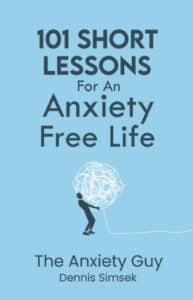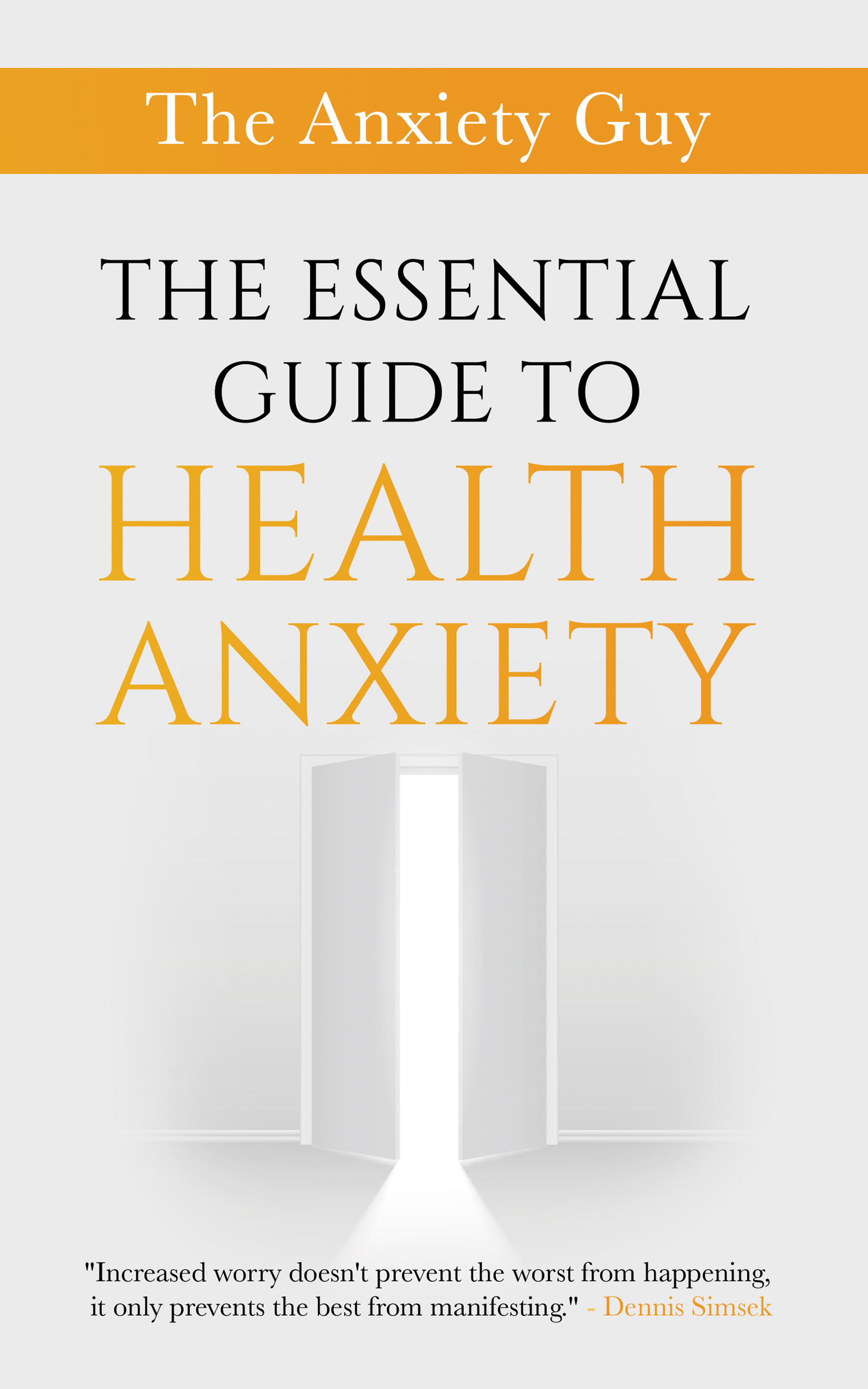Spiritual growth very often takes place unknowingly when a person begins healing their anxiety. It’s an awakening that can either intrigue a person or scare them away. Today, on The Anxiety Guy Podcast I’ll show you the best way to embrace your personal spiritual journey. Enjoy the episode warriors.
Embracing the Journey: Unleashing Spiritual Growth Through Anxiety Recovery
Are you ready to embark on a transformative journey?
In a world filled with constant hustle and bustle, it’s all too easy to neglect our spiritual well-being. But what if I told you that anxiety recovery can be the catalyst for unlocking your spiritual growth? In this captivating exploration, we will delve into the powerful connection between anxiety recovery and spiritual awakening.
By embracing the challenges and triumphs of anxiety recovery, we can uncover a deeper understanding of ourselves, our purpose, and our place in the world.
Through insightful guidance and practical techniques, we will navigate the twists and turns of this journey through today’s podcast, uncovering hidden gems of wisdom and self-discovery along the way. So, are you ready to embrace the journey and unleash your spiritual growth? Let’s embark on this transformative adventure together through listening to today’s podcast episode and reading further…
Understanding anxiety and its impact on spiritual growth
Anxiety is a common experience that can manifest in various forms, from generalized anxiety disorder to panic attacks. It can feel overwhelming and debilitating, often hindering our ability to fully engage with life. But what if we looked at anxiety through a different lens?
Rather than seeing it as a burden, we can view it as an opportunity for growth and transformation.
Anxiety has the power to awaken us to our deepest fears and insecurities, pushing us to confront and transcend them. In this sense, anxiety becomes a catalyst for spiritual growth.
When we experience anxiety, we are forced to confront the limitations of our ego-driven self. I can attest to this deeply from my own anxiety disorder recovery. We realize that we are not in control of everything, and this recognition opens the door to a deeper understanding of our interconnectedness with the world around us.
Anxiety can serve as a wake-up call, urging us to explore the spiritual dimensions of our existence. It encourages us to seek meaning and purpose beyond the material realm, leading us on a journey of self-discovery and spiritual awakening.
Anxiety also highlights the importance of self-care and self-compassion. As we navigate the challenges of anxiety recovery, we learn to cultivate a greater sense of love and acceptance for ourselves. This self-compassion is an essential ingredient for spiritual growth, as it allows us to embrace our imperfections and release the need for perfection.
By nurturing ourselves with kindness and understanding, we create a fertile ground for spiritual transformation to take place.
The connection between spirituality and mental health
Spirituality and mental health are intricately intertwined. While mental health focuses on the well-being of our mind and emotions, spirituality explores the deeper aspects of our being. Both paths seek to bring us closer to wholeness and a sense of purpose. When we embark on the journey of anxiety recovery, we inevitably encounter the intersection of these two realms.
Spirituality provides us with a framework for understanding and making sense of our experiences.
It offers guidance and wisdom that can support us on our path to healing and growth. By engaging in spiritual practices such as meditation, prayer, or mindfulness, we can cultivate a sense of inner peace and resilience in the face of anxiety. These practices help us develop a deeper connection with our inner selves and the divine, providing us with the strength and clarity needed to navigate the challenges of anxiety recovery.
Mental health, on the other hand, provides us with the tools and resources to manage anxiety effectively.
Therapy, emotional reframing of past events and relationships, medication (when the time is right), and self-care practices are essential components of anxiety recovery. When combined with spiritual practices, they create a holistic approach that addresses the needs of our mind, body, and spirit. This integration allows us to heal on multiple levels, fostering a sense of balance and well-being.
Embracing the journey of anxiety recovery
Anxiety recovery is not a linear path. It is a journey filled with ups and downs, twists and turns. But it is through this journey that we can uncover hidden gems of wisdom and self-discovery. Embracing the challenges and triumphs of anxiety recovery requires a mindset of curiosity and openness. It calls us to surrender to the process and trust in our innate capacity for growth and transformation.
One essential aspect of this journey is cultivating mindfulness and self-awareness.
Mindfulness allows us to observe our thoughts and emotions without judgment, creating space for self-reflection and personal growth. By practicing mindfulness, we can become more attuned to the patterns and triggers of our anxiety, empowering us to respond with greater clarity and compassion.
Self-awareness also enables us to identify and challenge the limiting beliefs and negative thought patterns that contribute to our anxiety. Through this process, we can rewrite our inner narrative and create a more empowering story for ourselves.
Utilizing spiritual practices for anxiety relief
Spiritual practices have long been used as a means of finding solace and peace in times of distress. When it comes to anxiety recovery, these practices can serve as powerful tools for relief and healing. Meditation, for example, allows us to quiet the mind and cultivate a sense of inner stillness.
Hypnosis for anxiety can also have a lasting impact on our spiritual growth.
By redirecting our focus from our anxious thoughts to the present moment, we can experience a profound sense of peace and calm.
Prayer is another spiritual practice that can provide comfort and support during anxiety recovery. Whether we pray to a higher power, the universe, or our own inner wisdom, prayer allows us to surrender our worries and fears. It reminds us that we are not alone in our journey and that there is a greater force at work in our lives.
Through prayer, we can find solace and guidance, knowing that we are held in a loving and supportive embrace.
In addition to meditation and prayer, other spiritual practices such as yoga, breathwork, or journaling can also be helpful in managing anxiety. These practices engage both the mind and body, creating a sense of harmony and balance. They allow us to release tension, cultivate presence, and connect with our inner selves. By incorporating these practices into our daily routine, we can create a sacred space for healing and growth.
Finding support and community in spiritual growth
Embarking on the journey of anxiety recovery can feel isolating at times. It’s important to remember that we are not alone in our struggles. There is a vast community of individuals who have walked this path before us and can offer support and guidance. Seeking out like-minded individuals who share a similar spiritual journey can be incredibly empowering and uplifting.
Joining support groups, attending spiritual retreats, or participating in online communities can provide a sense of belonging and validation. These spaces allow us to share our experiences, learn from others, and find solace in knowing that we are not alone. The connections we form in these communities can become a source of inspiration and strength as we navigate the challenges of anxiety recovery.
In addition to seeking external support, we can also cultivate a sense of community within ourselves.
Connecting with our own inner wisdom and higher self can provide a deep sense of guidance and support. Through practices such as surrender sessions or journaling, we can tap into our intuition and access the wisdom that resides within us. This inner connection can be a source of strength and resilience as we embrace the journey of anxiety recovery.
Overcoming spiritual blocks and resistance
As we delve deeper into our spiritual growth, we may encounter blocks and resistance along the way. These blocks can manifest as self-doubt, fear, or a reluctance to let go of old patterns and beliefs. It’s important to recognize and address these blocks with compassion and curiosity.
One effective way to overcome spiritual blocks is to engage in shadow work. This involves exploring the parts of ourselves that we have suppressed or denied. By shining a light on our shadow aspects, we can integrate them into our being and embrace our wholeness.
This process allows us to release the resistance that holds us back and create space for spiritual growth.
Another powerful tool for overcoming spiritual blocks is forgiveness. By forgiving ourselves and others, we release the energetic ties that bind us to the past. Forgiveness liberates us from resentment and allows us to move forward with a sense of lightness and freedom. It opens the door to new possibilities and creates space for spiritual expansion.
Nurturing self-care and self-compassion
Self-care and self-compassion are vital components of anxiety recovery and spiritual growth. It’s important to prioritize our well-being and create a nurturing environment for ourselves. This involves setting boundaries, practicing self-care rituals, and cultivating a loving relationship with ourselves.
Setting boundaries is essential for protecting our energy and maintaining a sense of balance. It means saying no when it serves our highest good and creating space for rest and rejuvenation. By honoring our boundaries, we communicate to ourselves and others that our well-being is a priority.
Practicing self-care rituals can help us connect with our bodies and nurture our souls.
This can include activities such as taking a relaxing bath, going for a walk in nature, or engaging in creative pursuits. By engaging in activities that bring us joy and peace, we recharge our energy and create space for spiritual growth.
Self-compassion is the foundation upon which self-care is built. It involves treating ourselves with kindness and understanding, especially during times of difficulty. When we approach ourselves with self-compassion, we embrace our imperfections and release the need for perfection. We recognize that we are doing the best we can and offer ourselves the same love and support we would give to a dear friend.
Embracing vulnerability and surrender in the journey
The journey of anxiety recovery and spiritual growth requires us to embrace vulnerability and surrender. It asks us to let go of our need for control and trust in the process. Vulnerability allows us to connect with our authentic selves and open ourselves up to new possibilities. It is through vulnerability that we can experience true healing and transformation.
Surrender, on the other hand, is about releasing our attachment to outcomes and surrendering to the flow of life.
It is about trusting that the universe has a greater plan for us and that everything is unfolding as it should. Surrendering to the journey of anxiety recovery allows us to let go of resistance and embrace the lessons and growth that come our way.
In this journey, it’s important to remember that there is no right or wrong way to navigate anxiety recovery and spiritual growth. Each person’s path is unique, and what works for one may not work for another. It’s essential to honor our own intuition and inner guidance as we navigate this transformative adventure.
Conclusion: Embracing the transformative power of anxiety recovery
Anxiety recovery is not just about finding relief from anxiety symptoms; it is a journey of self-discovery and spiritual growth. By embracing the challenges and triumphs of anxiety recovery, we can uncover hidden gems of wisdom and unlock our true potential.
Through cultivating mindfulness, utilizing spiritual practices, finding support and community, and nurturing self-care and self-compassion, we can navigate this transformative journey with grace and resilience.
Embracing vulnerability and surrendering to the process allows us to open ourselves up to the transformative power of anxiety recovery. It is through this journey that we can unleash our spiritual growth, gaining a deeper understanding of ourselves, our purpose, and our place in the world.
So, are you ready to embark on this transformative adventure? Embrace the journey, and let your spiritual growth unfold.




















I love what you said about how “Spirituality provides us with a framework for understanding and making sense of our experiences, and that it offers guidance and wisdom that can support us on our path to healing and growth.”
And I appreciate that you recognize spirituality as different to different people:
“Whether we pray to a higher power, the universe, or our own inner wisdom, prayer allows us to surrender our worries and fears.” Telling us we are not alone in our journey, having that force greater than us at work. It can definitely help ease your anxiety.